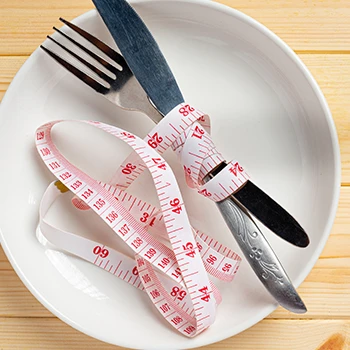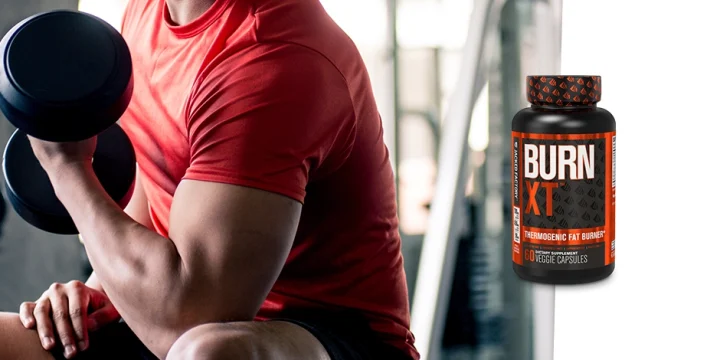Losing weight can be a huge challenge for anyone who has struggled with obesity and even athletes who need to go through a cutting phase after some muscle weight gain.
As a personal trainer, I've had plenty of people ask me whether they could speed up their weight loss with a starvation diet.
The theory of practically eliminating the number of calories you consume is appealing, but most people aren't aware of what actually happens or the risks.
Let me explain what my research has revealed.
Quick Summary
- You will initially lose body fat when you starve yourself, but that effect usually wears off quickly as your body adjusts the basal metabolic rate.
- Your body weight is largely dependent on how much you eat and a calorie-deficit diet, but starvation brings some issues that most people aren't aware of.
- A 10% calorie deficit that gives your body all the nutrients it needs to sustain healthy organ and muscle function is better for fat loss than going into starvation mode.
- In my opinion, combining moderate calorie control with regular exercise is the most effective and sustainable method for healthy weight loss.
How Does Starving Affect Your Body?

From my time coaching clients, I've observed that eating too little not only limits weight loss but also brings a host of side effects.
Metabolic Adaptation
Studies published in the Journal of the International Society of Sports Nutrition have shown that when you drastically reduce how much food you eat, it can initially trigger significant weight loss. But as the body realizes what's happening, it changes the basal metabolic rate (BMR) [1].
This means that you don't burn as many calories, and that limits how you lose weight and puts a floor under your body fat percentage.
Organ Function
As you lose fat and your body starts burning fewer calories, it can also result in vital organs shrinking in size to preserve energy, as shown by NPR (National Public Radio) reports [2]. How quickly this happens is unclear, but some of these reductions in organ sizes can become a serious issue that leads to permanent damage.
Mental Impacts
As a health coach, I've observed the psychological toll of extreme dieting in clients, from heightened stress and anxiety to serious mental health issues, echoing findings in the National Library of Medicine [3].
Obsession with fat loss can lead to profound psychological and self-esteem issues.
Muscle Mass
Bodybuilders and athletes should note that drastic food reduction can lead to rapid lean mass loss, as shown in studies by the American Journal of Clinical Nutrition [4].
This can mean up to a 5% muscle tissue reduction, negating bulking efforts and decreasing physical performance and energy, which impacts overall health and strength.
Do You Lose Belly Fat If You Starve?

Initially, starving can reduce belly fat, but this effect soon diminishes.
Starvation disrupts hormonal balance, impacting thyroid and reproductive health, and can cause broader health issues, including affecting lean mass and organ function [5]. Our bodies naturally use fat reserves when caloric intake drops—a survival mechanism from evolution.
As a fitness coach, I've observed that starvation diets often backfire, triggering the body to conserve fat, a response noted by the International Journal of Obesity [6].
Clients see better results with a balanced diet and exercise, focusing on overall health, not just weight loss.

Starving vs Intermittent Fasting

Starving yourself, which means not eating for extended periods, differs significantly from intermittent fasting, where you extend the time between meals.
While starvation can initially lead to weight loss, it often slows metabolism and fat loss.
In contrast, intermittent fasting, like eating dinner at 6 pm and then fasting until a late breakfast or lunch the next day, is a more structured approach that doesn't drastically slow down metabolism.
"The 16:8 protocol is a type of intermittent fasting (known as time-restricted eating in the scientific literature) that involves abstaining from calories for 16 hours of the day, and then eating within an 8-hour window."
- Nick Milazzo, MSC in Medical Science, MPH, Examine.com
This is very different from starving yourself as you will still be eating a healthy diet with a reduced calorie intake. It shouldn't have a drastic impact on your metabolic rate, and you'll burn calories more efficiently, especially if you do physical activity while fasting.
Do Starvation Diets Really Work?
No, starvation diets don't really work for weight loss. Your body is highly reliant on a certain amount of macro and micronutrients. Along with all the body fat you might lose, you'll also lose lean muscle tissue and other fat-free mass-like organs.
Furthermore, such diets can lead to nutritional deficiencies, weaken the immune system, impair brain function, and cause poor bone health, which are critical aspects often overlooked in the discussion of starvation diets.
Moreover, such diets often result in rapid weight regain, leading to a higher body mass once normal eating resumes.
Related: Does Being Hungry Make You Lose Weight?
Safer And Healthier Ways To Lose Weight

Rather than resort to starvation, it's better to choose a safer and more effective way to lose weight. I have coached a lot of people to achieve significant weight loss goals, and there really are just two things to focus on.
Healthy Dieting
In my client work, I've found starting with a 10% calorie deficit and gradually increasing to 30-40% offers sustainable weight loss without draining energy or health.
Adding a natural fat burner supplement can further aid this process by reducing hunger cravings.
Physical Exercise
Based on my clients' success, I suggest at least three weekly exercise sessions for improved heart health and weight loss.
On other days, light cardio like walking helps burn more energy.
For bodybuilders cutting fat, 4-5 gym sessions with high intensity but lower weights and more reps are effective.
FAQs
How Much Weight Will You Lose If You Stop Eating For One Day?
You can lose about half a pound if you stop eating for one day. But it's important to note that you'll mainly lose water weight. To lose body fat, you'll need to restrict your calorie intake for many weeks.
Is Starvation The Most Effective Way To Deal With Body Fat?
No, starvation is not the most effective way to deal with body fat. Losing body fat consistently requires you to supply your body with critical micro and macronutrients. It's more sustainable to slightly reduce your calories for lasting weight loss.
Take The Safer Approach For Your Weight Loss Efforts
Many people are tempted by extreme dieting techniques, only to figure out that the lost mass is a mix of water, muscle, and organ tissue.
That's not a sustainable solution and can lead to many health issues, as mentioned above.
Instead, stick with reducing your calories slightly and exercising more regularly. You can also add one of the next supplements to your daily routine and burn some extra calories each day.
It's not a magic pill, but over the weeks and months, this will have a significant impact.
References:
- https://www.tandfonline.com/doi/full/10.1186/1550-2783-11-7
- https://www.npr.org/sections/goatsandsoda/2016/01/20/463710330/what-happens-to-the-body-and-mind-when-starvation-sets-in?t=1655842862323
- https://pubmed.ncbi.nlm.nih.gov/24925491/
- https://www.sciencedirect.com/science/article/pii/S0002916523137051?via%3Dihub
- https://us.humankinetics.com/blogs/excerpt/the-bodys-fuel-sources
- https://www.nature.com/articles/ijo2010184
About The Author
You May Also Like






